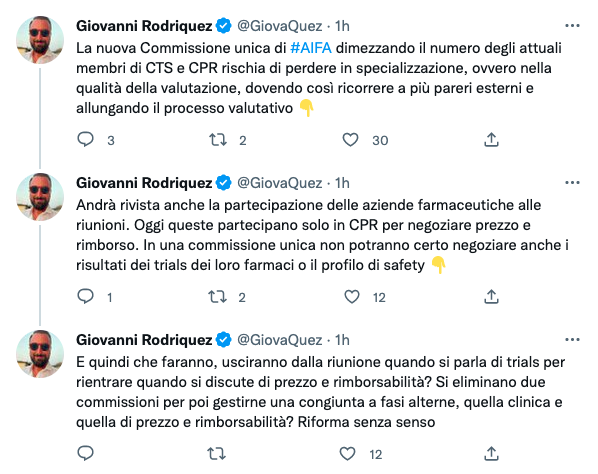This is what the new Aifa will look like according to the reform (aumm aumm) of the Meloni government

The AIFA reform, included with amendments in a government decree, has gone quietly but some important changes are perplexing. Facts and comments
With the new government of the Prime Minister Giorgia Meloni, the changes to the Italian Medicines Agency (Aifa) were in the air but, although they took place very quietly, it is a real revolution. And the first head destined to jump is that of the general manager Nicola Magrini…
Here's what will change.
WHO WANTED THE REFORM
The text of the two amendments to the NATO decree, which in fact completely reforms AIFA, was presented by the group leaders of Forza Italia and Fratelli d'Italia in the Social Affairs, Health and Labor Commission of the Senate, respectively Francesco Silvestro and Ignazio Zullo.
HOW AIFA CHANGES
The first big change is that the figure of the general manager will no longer exist, who currently has all the management powers of the agency and directs its activity.
Furthermore, the new Aifa repeals both the Technical-Scientific Commission (CTS) and the Prices and Reimbursement Committee (CPR), which are replaced by a single Scientific and Economic Commission (CSE) of only ten members, while currently each of the two Commissions has ten each.
Finally, the president (now Giorgio Palù ) of the agency becomes the institution's legal representative.
The AIFA Board of Directors, on the other hand, always remains made up of 5 members: the president, two representatives indicated by the Ministry of Health and two representatives indicated by the State-Regions Conference.
THE METHOD OF APPOINTMENT
A new decree will no longer establish only the functions of the president but also the criteria and methods for appointing him, whereas until now he was designated by the Minister of Health in agreement with the State-Regions Conference.
The same goes for both the appointment of the administrative director and the technical-scientific director – two figures established by the 2019 reform of the former Minister of Health Giulia Grillo, but never named – and for the ten members of the CSE.
WHEN THE CHANGES WILL BE EFFECTIVE
While the abolition of the figure of the general manager will become effective as soon as the decree is converted into law, the new single Commission will not take office before 1 March 2023 because it is necessary to wait for the expiry of the extension of the Cts and the Cpr, set for on February 28, 2023.
THE RISKS OF THE REFORM
According to the journalist Giovanni Rodriquez of Quotidiano Sanità , this reform by means of an amendment leaves open at least two major questions that pose risks.
The first, he states in his article, is of a political nature because the abolition of the figure of general manager would "make the system of checks and balances disappear which over the years has guaranteed a certain balance " given that "to date, done, the general manager was chosen by the Minister of Health while the president by the Regions ”. Now, however, between the methods of appointing the president who will assume all powers and the lack of a new system of balances that guarantees the independence of the technical-scientific assessment, "the risk is that a strong imbalance will be created towards the policy dictated by the Ministry of Health”.
The second has to do with the birth of a single Commission which replaces the Cts and Cpr and, therefore, writes Rodriquez, "the risk is that in order to carry out a reform quickly, with no budgetary changes, a work overload within the new commission, with related delays in approvals, given the small number of members”.

And in addition to possible delays, Repubblica underlines that the abolition of Cts and Cpr also poses the potential risk of being crushed by Big Pharma, which "sometimes has a tendency to put more and more products on the market (even unnecessary ones) and at prices for them favourable".
WHO IS FOR AND WHO IS AGAINST THE AIFA REFORM
The Minister of Health, Orazio Schillaci, obviously defended the reform by explaining that Aifa, in his opinion, "needs a review and modernization", starting with governance.
While, on the other hand, the senator of the Democratic Party and former health minister, Beatrice Lorenzin , attacks the provision precisely on this aspect: "With the new governance centralized in the hands of the President of the Board of Directors, of a totally political nature, the mission is distorted of the Agency and its independent scientific nature as well as the virtuous balance of powers and responsibilities”.
It's not a good sign that the #Government chooses to carry out the governance reform of #Aifa with two amendments from the majority. The Agency is strategic for our country, central to independent #research and fundamental to the competitiveness of the drug supply chain. pic.twitter.com/IQJCE38FuL
— Beatrice Lorenzin (@BeaLorenzin) November 29, 2022
Senator dem Sandra Zampa (Head of Health of the Democratic Party and former Undersecretary of Health), writes Panorama Sanità , also expressed concern about the provisions on Aifa, "which cannot be reformed through an amendment", and Senator Graziano Delrio (Pd) he said he would have liked to vote in favor of the decree but then had to abstain precisely "due to the forcing that the health minister operated on the AIFA reform, without consulting the Regions and the companies that produce drugs".
Even the economist and Pd senator Carlo Cottarelli spoke out against it with a tweet:
Today the Senate approved the reform of the Medicines Agency (AIFA) with a "last minute" government amendment to a decree law and therefore without adequate reflection. In fact, AIFA's autonomy is reduced by exposing key decisions for health to lobbying pressure.
— Carlo Cottarelli (@CottarelliCPI) November 30, 2022
This is a machine translation from Italian language of a post published on Start Magazine at the URL https://www.startmag.it/sanita/ecco-come-sara-la-nuova-aifa-secondo-la-riforma-aumm-aumm-del-governo-meloni/ on Mon, 05 Dec 2022 06:57:00 +0000.
